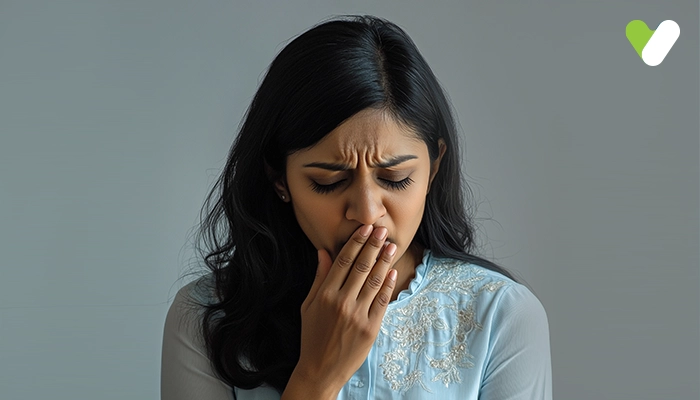You've just finished a relishing lunch or a refreshing lime soda, and voila! You start getting hiccups. Sounds familiar? It happens with almost everybody and when having water is not a wise decision. So let's have a closer look at hiccups and their possible causes and treatments.
What Are Hiccups?
Hiccups are involuntary repeated contractions in the diaphragm- a muscle under the rib cage that separates your chest from the abdomen and helps you to breathe. A 'hic' sound mainly accompanies it. Let's understand the functioning of your diaphragm to know why you hiccup.It's the contraction and relaxation of the diaphragm that helps us breathe. While inhaling, the diaphragm contracts resulting in an enlarged chest cavity that pulls air into the lungs. Whereas while exhaling, the diaphragm relaxes and expands, pushing the lungs, forcing air out of the system.
This contraction and relaxation is an ongoing process that happens in a rhythm. But situations in which the diaphragm contracts out of the rhythm are what causes hiccups. A hiccup is nothing but a sudden rush of air inside your lungs resulting from the larynx and vocal cords closing suddenly. Our body reacts to this movement with a gasp or chirp.
There's no way one can anticipate a hiccup. They may start or end abruptly, lasting for a few minutes. But in some rare medical or psychological conditions, a hiccup can last longer than usual and abruptly average human body functioning. So let's have a look at some general causes of hiccups.
Top 10 Triggers of Hiccup
- Carbonated beverages or alcohol
- Overeating or eating too quickly
- Sudden excitement or emotional stress
- Sudden change in temperature
- Overstretching neck muscles
- Consuming drugs
- Very hot or icy drinks
- Patients going through chemotherapy
- Accidental exposure to toxic fumes
- Received a shot of general anesthesia
Top 9 Causes of Long-Term Hiccups
- Cancer or tumour
- Problems in oesophagus
- gastrointestinal and abdominal disorders
- Strokes
- Uremia.
- Pneumonia.
- Bowel issues
- Pancreatitis or bladder irritation
- Hepatitis or liver cancer
- You've been having hiccups for how long?
- How often does it happen?
- Did you try any home remedies?
- Would you like to take a medical treatment to address the issue?
- Are you suffering from GERD?
- Do you have a history of cancer, strokes, or tumours in the family?
Top 9 Treatment for Hiccups
There are various home remedies you can try to treat a hiccup. These remedies may or may not work well unless you know the underlying cause behind the same. But as starters, it's a good idea to try them first and then approach a doctor in case no results are achieved. Here's what you can do:- Drink water
- Eat sugar granules or dry bread pieces, or crushed ice
- Pull your tongue (gently)
- Stick a finger down the throat
- Deep breathing - inhale and hold your breath for 3 seconds before exhaling. Repeat this thrice
- Gargle
- Taking short breaths into a paper bag
- Try gasping or belching
- Lie down on your back and hold your knees close to your chest
- Try the Valsalva maneuver by strongly breathing out of your mouth while holding your nose tightly.
Top 7 Medications for Hiccups
In severe cases, your doctor may prescribe medicine after closely analyzing your symptoms and the causes behind your hiccups.Here are the medicine commonly used:
- Gabapentin
- Baclofen
- Chlorpromazine and haloperidol
- benzodiazepines
- diphenhydramine (Benadryl)
- metoclopramide (Reglan)
- nifedipine (Procardia, Procardia XL)
- Nasogastric intubation
- Stomach pumping
- An attempt to block the phrenic nerve through an anesthetic injection
- Pacemaker implant
Whom to Consult?
While there's nothing like a 'hiccup specialist,' you may get a treatment depending on the underlying causes.- In case of stroke or neurological disorders, you may consult a neurologist
- In case of acid refluxes, consult a gastroenterologist
- In case of lung diseases, consult a pulmonologist


